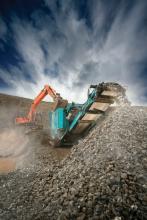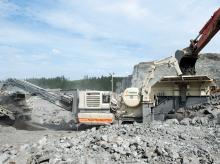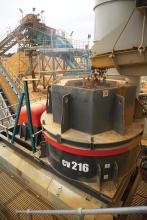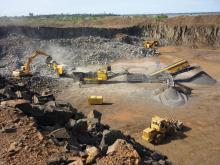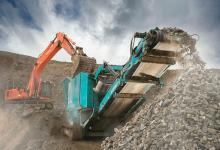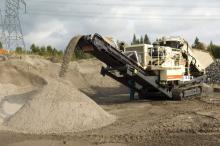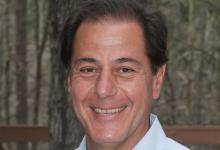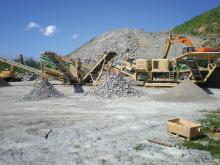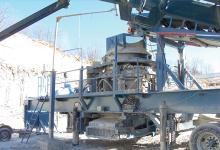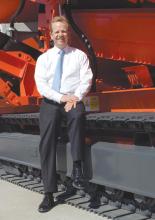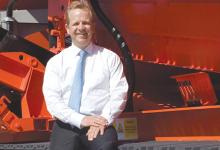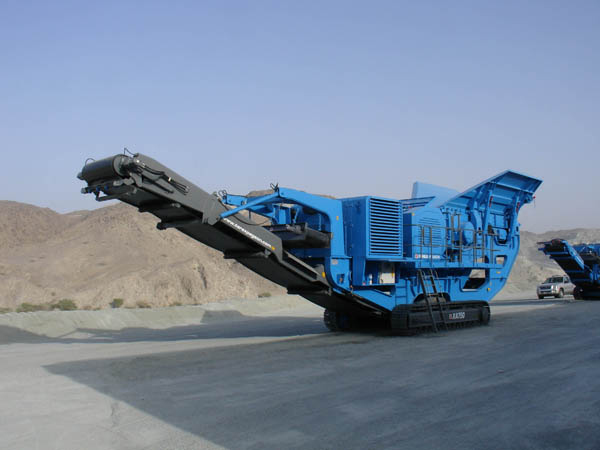
Pegson and Powerscreen are two of the major players in the quarrying and mining business and they now have common goals. Patrick Smith spoke to the companies' new global sales director to find out more
Two major quarrying equipment manufacturers have outlined their plans for the future, under a common strategy. Quarry product equipment manufacturers
The new director, Patrick Brian, started with the company in October 2007, having moved from Johnson Matthey, a leading metals company. He realises that the competition in the sector is tough, but feels that the two different but complementary product lines offer major possibilities for growth.
"I think in terms of strategy we have a clearly defined goal of being the number one global producer of mobile crushing and screening equipment. I personally feel that we hold that position anyway but it is certainly our goal to strengthen it further," said Brian.
Terex Pegson, which produces a wide range mobile crushing plant for quarrying, mining, construction and demolition waste recycling, is based in Coalville, Leicestershire, UK, and traces its history back to 1830 when Samuel Pegg opened a textile factory in the city of Leicester. In 1932 the company moved to its current site changing its name to Pegson and started manufacturing quarry crushing equipment. It employs 375 people at the 6,900m² factory building.
Powerscreen, based in Dungannon, Northern Ireland, employs some 600 people and has a 33,400m² factory. It was established in 1966 and produces screening equipment, claiming to have pioneered the 'mobile' screening concept.
Combined network
Powerscreen and Terex Pegson sell worldwide through a single global network of over 130 dealers who sell and support 50-plus products.
It is this network of dealers and distributors that Brian sees as a key to introducing new products, leveraging business in new segments and territories, and ensuring top quality customer support.
Both companies came under the Terex umbrella in 1999 following the acquisition of Powerscreen by the group. Some three years earlier Powerscreen had acquired Pegson, and in 1997 it merged it with respected crusher manufacture Brown Lennox to form BL-Pegson.
The acquisition by Terex is said to have opened a wealth of opportunities for Pegson which launched additional track-mounted crushing plants, while Powerscreen, part of Terex Crushing and Screening, has an office in Louisville, Kentucky, US to provide immediate backup to the North American market.
Brian said, "Within Powerscreen and Pegson we have two distinct yet complementary product lines: Pegson makes only mobile crushers and Powerscreen makes screens of all types. These are joined within the Materials Processing and Mining Division by other businesses in the same fields that have been acquired by the Terex Group.
"This gives us a comprehensive range of products to offer the market," Brian. "Basically what has happened over the last two years is that Powerscreen and Pegson have aligned their dealer networks. Historically they have had separate dealers and now the alignment is completed. This means that with the single dealer network and sales team that rather than have two sales directors we now only have one, which will give us clarity of strategic focus.
"The factories are run independently and we have our own suppliers, although we do share best practice for after market support and research and development engineering.
"I think the message is that we have got a combined focus on the marketplace. It has certainly led to efficiency in our working relationship with the dealer networks, and there is significant other benefits anticipated moving forward."
Critical mass
Brian said that the new set up has given Pegson and Powerscreen dealers a critical mass of products.
"Previously they only had Pegson or Powerscreen and now they have both, giving them a much stronger presence in the market place," he said. "We want to position ourselves for market dynamics that are moving away from static to mobile plant with an ever increasing important share taken up by tracked machines.
"What are the other pillars of strategy? We see a first class after market support as one of our key strategy pillars, and we also see the enhancement of our global dealer network as key along with a resurgent development programme.
"We are using lean principles throughout the business for operational efficiency." Brian pointed out that much of the production from both Pegson and Powerscreen is exported with the UK accounting for about 10% of the business.
"Europe, excluding the UK, accounts for about 35% of our business; North America is 30%, and the remainder goes all over the world, but we are particularly strong in India, although China is not an area we have tackled properly yet but having made a good impact in India and Russia, we will continue to focus on emerging markets." However, while saying that the companies are increasing their factory footprint in the UK, Brian does not want, at this point, to go into too much detail about research and development as a core pillar of the business strategy, but says that 2008 will see "the largest number of new product launches from both factories that we have ever undertaken." Indeed, at the recent
Product information
"We are delighted with our position at present, and we have a very structured new product introduction process which begins with basic research with end users and our dealer network. We are also set to run a number of global symposia in 2008 which will help steer and deliver future strategy," said Brian.
"As for the future, there are some things under discussion I don't want to disclose. The general strategy is set, proving successful, and that will not change." As for the number of manufacturers contracting because of acquisitions, this is seen as "a continuing trend" and this will mean both Pegson and Powerscreen will look to be in "a better position to serve global and strategic accounts as effectively as we can." Brian added, "I think we would say that in recent years there has been a consolidation of crushing and screening equipment manufacturers and we would expect this to continue, but we will be ready to compete.
"For example, we are not seeing Chinese or Indian manufacturers operating to any large degree outside their own countries but we are conscious of that future threat to our business and we will put strategies in place to make sure we are competitive on a global basis."

